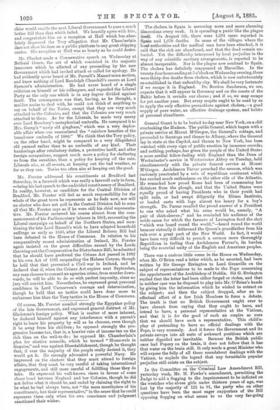Mr. Forster addressed his constituents at Bradford last Saturday, in
a farewell which was really a farewell only in form, —being his last speech to the undivided constituency of Bradford. In reality, however, as candidate for the Central Division of Bradford, Mr. Forster will feel as much responsibility for the whole of the great town he represents as he feels now, nor will an elector who does not poll in the Central Division fail to scan all that Mr. Forster says as if he were still his chief representa- tive. Mr. Forster reviewed his course almost from the com- mencement of his Parliamentary labours in 1861, recounting the Liberal campaign on behalf of the Northern States, and men- tioning the late Lord Russell's wish to have adopted household suffrage as early as 1866, after the Liberal Reform Bill had been defeated in the House of Commons. In relation to his comparatively recent administration of Ireland, Mr. Forster again insisted on the great difficulties caused by the Lords throwing out the Compensation for Disturbance Bill; he admitted that he should have preferred the Crimes Act passed in 1882 to his own Act of 1881 suspending the Habeas Corpus, though he held that that prevented a Civil war in Ireland, and he declared that if, when the Crimes Act expires next September, any man chooses to commit an agrarian crime, from murder down- wards, he will be able to do so with perfect impunity, since no jury will convict him. Nevertheless, he expressed great personal confidence in Lord Carnarvon's courage and determination, though he held that no tactics could have done more to embarrass him than the Tory tactics in the House of Commons.


































 Previous page
Previous page